Thoreau & Crevecoeur: Perspectives on Slavery and Civil Disobedience
VerifiedAdded on 2022/08/19
|5
|1301
|12
Essay
AI Summary
This essay examines the negative connotations and arguments against slavery through a comparative analysis of Henry David Thoreau’s 'Resistance to Civil Government' and J. Hector St. John de Crevecoeur’s 'Letters from an American Farmer.' It highlights the traits of Transcendentalism in both works, where individuals seek knowledge beyond conventional understanding. Thoreau critiques the government's inefficiency and advocates for civil disobedience, while Crevecoeur initially idealizes America but later confronts the hypocrisy of slavery. The essay explores the use of literary techniques like irony, symbolism, and imagery to expose the moral wrongness of slavery and question governmental authority, ultimately emphasizing the importance of individual morality and resistance against injustice. The essay concludes that both authors reveal the morally reprehensible nature of slavery and advocate for individual resistance against unjust governance through their respective narratives and literary devices.
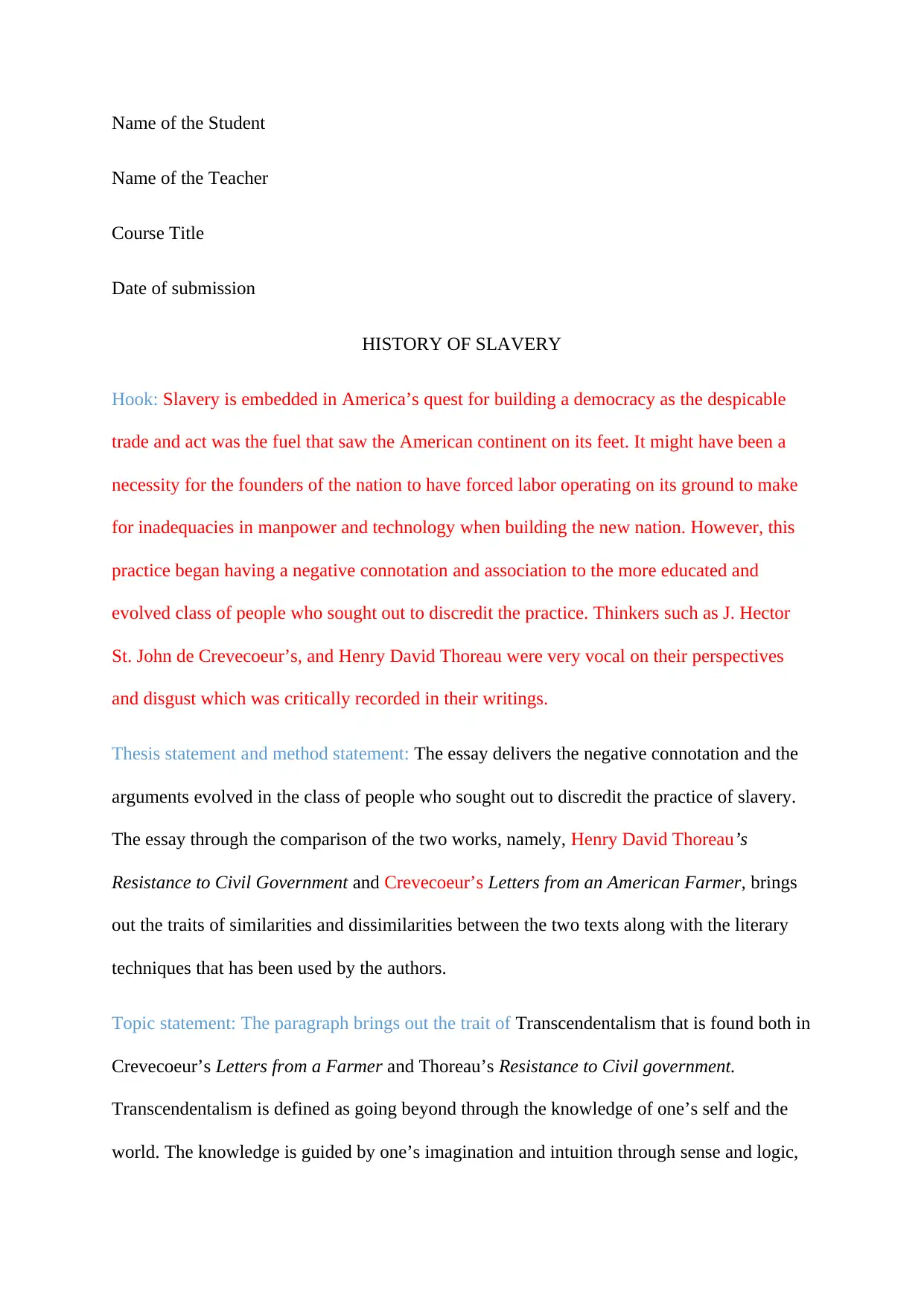
Name of the Student
Name of the Teacher
Course Title
Date of submission
HISTORY OF SLAVERY
Hook: Slavery is embedded in America’s quest for building a democracy as the despicable
trade and act was the fuel that saw the American continent on its feet. It might have been a
necessity for the founders of the nation to have forced labor operating on its ground to make
for inadequacies in manpower and technology when building the new nation. However, this
practice began having a negative connotation and association to the more educated and
evolved class of people who sought out to discredit the practice. Thinkers such as J. Hector
St. John de Crevecoeur’s, and Henry David Thoreau were very vocal on their perspectives
and disgust which was critically recorded in their writings.
Thesis statement and method statement: The essay delivers the negative connotation and the
arguments evolved in the class of people who sought out to discredit the practice of slavery.
The essay through the comparison of the two works, namely, Henry David Thoreau’s
Resistance to Civil Government and Crevecoeur’s Letters from an American Farmer, brings
out the traits of similarities and dissimilarities between the two texts along with the literary
techniques that has been used by the authors.
Topic statement: The paragraph brings out the trait of Transcendentalism that is found both in
Crevecoeur’s Letters from a Farmer and Thoreau’s Resistance to Civil government.
Transcendentalism is defined as going beyond through the knowledge of one’s self and the
world. The knowledge is guided by one’s imagination and intuition through sense and logic,
Name of the Teacher
Course Title
Date of submission
HISTORY OF SLAVERY
Hook: Slavery is embedded in America’s quest for building a democracy as the despicable
trade and act was the fuel that saw the American continent on its feet. It might have been a
necessity for the founders of the nation to have forced labor operating on its ground to make
for inadequacies in manpower and technology when building the new nation. However, this
practice began having a negative connotation and association to the more educated and
evolved class of people who sought out to discredit the practice. Thinkers such as J. Hector
St. John de Crevecoeur’s, and Henry David Thoreau were very vocal on their perspectives
and disgust which was critically recorded in their writings.
Thesis statement and method statement: The essay delivers the negative connotation and the
arguments evolved in the class of people who sought out to discredit the practice of slavery.
The essay through the comparison of the two works, namely, Henry David Thoreau’s
Resistance to Civil Government and Crevecoeur’s Letters from an American Farmer, brings
out the traits of similarities and dissimilarities between the two texts along with the literary
techniques that has been used by the authors.
Topic statement: The paragraph brings out the trait of Transcendentalism that is found both in
Crevecoeur’s Letters from a Farmer and Thoreau’s Resistance to Civil government.
Transcendentalism is defined as going beyond through the knowledge of one’s self and the
world. The knowledge is guided by one’s imagination and intuition through sense and logic,
Paraphrase This Document
Need a fresh take? Get an instant paraphrase of this document with our AI Paraphraser
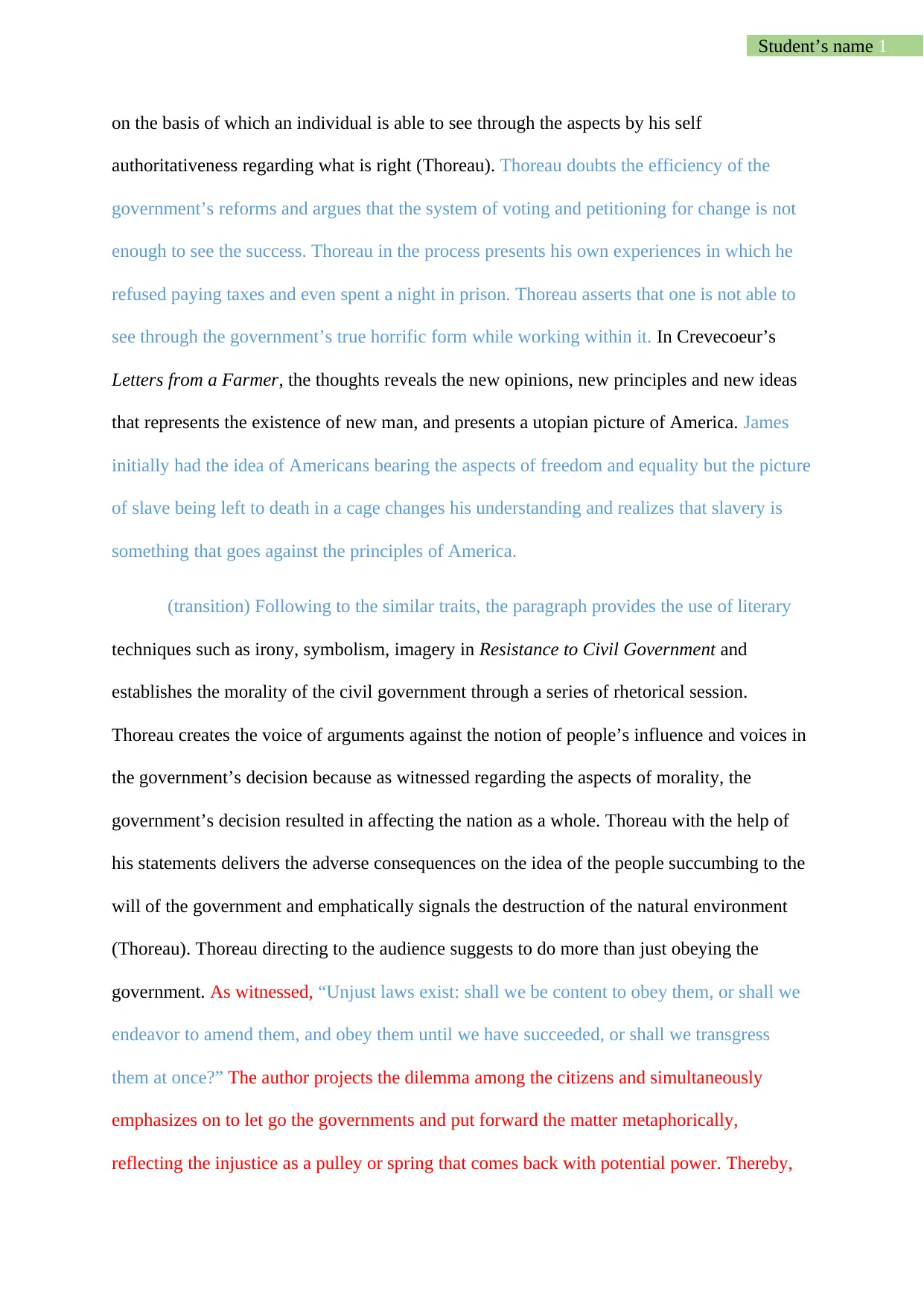
Student’s name 1
on the basis of which an individual is able to see through the aspects by his self
authoritativeness regarding what is right (Thoreau). Thoreau doubts the efficiency of the
government’s reforms and argues that the system of voting and petitioning for change is not
enough to see the success. Thoreau in the process presents his own experiences in which he
refused paying taxes and even spent a night in prison. Thoreau asserts that one is not able to
see through the government’s true horrific form while working within it. In Crevecoeur’s
Letters from a Farmer, the thoughts reveals the new opinions, new principles and new ideas
that represents the existence of new man, and presents a utopian picture of America. James
initially had the idea of Americans bearing the aspects of freedom and equality but the picture
of slave being left to death in a cage changes his understanding and realizes that slavery is
something that goes against the principles of America.
(transition) Following to the similar traits, the paragraph provides the use of literary
techniques such as irony, symbolism, imagery in Resistance to Civil Government and
establishes the morality of the civil government through a series of rhetorical session.
Thoreau creates the voice of arguments against the notion of people’s influence and voices in
the government’s decision because as witnessed regarding the aspects of morality, the
government’s decision resulted in affecting the nation as a whole. Thoreau with the help of
his statements delivers the adverse consequences on the idea of the people succumbing to the
will of the government and emphatically signals the destruction of the natural environment
(Thoreau). Thoreau directing to the audience suggests to do more than just obeying the
government. As witnessed, “Unjust laws exist: shall we be content to obey them, or shall we
endeavor to amend them, and obey them until we have succeeded, or shall we transgress
them at once?” The author projects the dilemma among the citizens and simultaneously
emphasizes on to let go the governments and put forward the matter metaphorically,
reflecting the injustice as a pulley or spring that comes back with potential power. Thereby,
on the basis of which an individual is able to see through the aspects by his self
authoritativeness regarding what is right (Thoreau). Thoreau doubts the efficiency of the
government’s reforms and argues that the system of voting and petitioning for change is not
enough to see the success. Thoreau in the process presents his own experiences in which he
refused paying taxes and even spent a night in prison. Thoreau asserts that one is not able to
see through the government’s true horrific form while working within it. In Crevecoeur’s
Letters from a Farmer, the thoughts reveals the new opinions, new principles and new ideas
that represents the existence of new man, and presents a utopian picture of America. James
initially had the idea of Americans bearing the aspects of freedom and equality but the picture
of slave being left to death in a cage changes his understanding and realizes that slavery is
something that goes against the principles of America.
(transition) Following to the similar traits, the paragraph provides the use of literary
techniques such as irony, symbolism, imagery in Resistance to Civil Government and
establishes the morality of the civil government through a series of rhetorical session.
Thoreau creates the voice of arguments against the notion of people’s influence and voices in
the government’s decision because as witnessed regarding the aspects of morality, the
government’s decision resulted in affecting the nation as a whole. Thoreau with the help of
his statements delivers the adverse consequences on the idea of the people succumbing to the
will of the government and emphatically signals the destruction of the natural environment
(Thoreau). Thoreau directing to the audience suggests to do more than just obeying the
government. As witnessed, “Unjust laws exist: shall we be content to obey them, or shall we
endeavor to amend them, and obey them until we have succeeded, or shall we transgress
them at once?” The author projects the dilemma among the citizens and simultaneously
emphasizes on to let go the governments and put forward the matter metaphorically,
reflecting the injustice as a pulley or spring that comes back with potential power. Thereby,
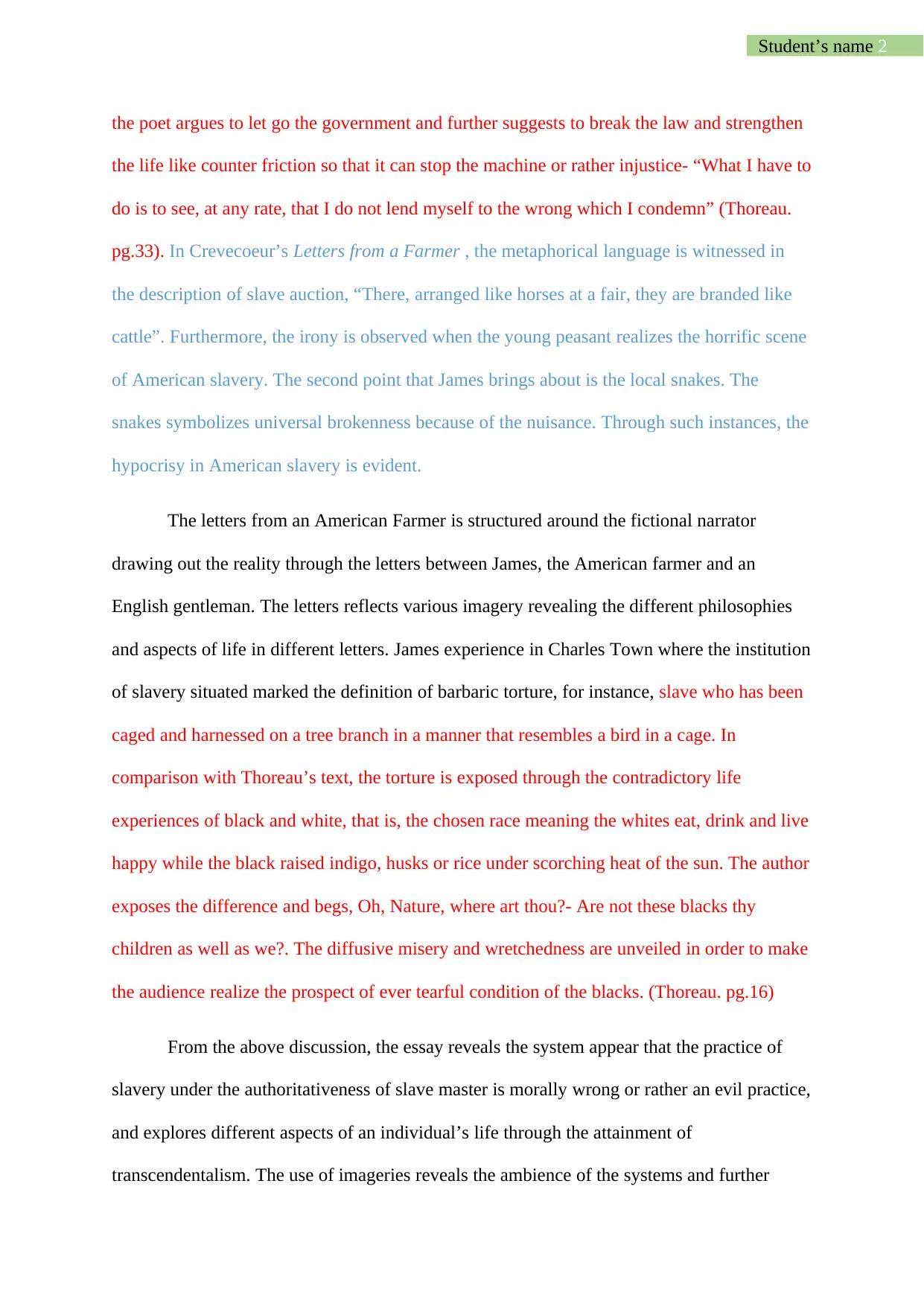
Student’s name 2
the poet argues to let go the government and further suggests to break the law and strengthen
the life like counter friction so that it can stop the machine or rather injustice- “What I have to
do is to see, at any rate, that I do not lend myself to the wrong which I condemn” (Thoreau.
pg.33). In Crevecoeur’s Letters from a Farmer , the metaphorical language is witnessed in
the description of slave auction, “There, arranged like horses at a fair, they are branded like
cattle”. Furthermore, the irony is observed when the young peasant realizes the horrific scene
of American slavery. The second point that James brings about is the local snakes. The
snakes symbolizes universal brokenness because of the nuisance. Through such instances, the
hypocrisy in American slavery is evident.
The letters from an American Farmer is structured around the fictional narrator
drawing out the reality through the letters between James, the American farmer and an
English gentleman. The letters reflects various imagery revealing the different philosophies
and aspects of life in different letters. James experience in Charles Town where the institution
of slavery situated marked the definition of barbaric torture, for instance, slave who has been
caged and harnessed on a tree branch in a manner that resembles a bird in a cage. In
comparison with Thoreau’s text, the torture is exposed through the contradictory life
experiences of black and white, that is, the chosen race meaning the whites eat, drink and live
happy while the black raised indigo, husks or rice under scorching heat of the sun. The author
exposes the difference and begs, Oh, Nature, where art thou?- Are not these blacks thy
children as well as we?. The diffusive misery and wretchedness are unveiled in order to make
the audience realize the prospect of ever tearful condition of the blacks. (Thoreau. pg.16)
From the above discussion, the essay reveals the system appear that the practice of
slavery under the authoritativeness of slave master is morally wrong or rather an evil practice,
and explores different aspects of an individual’s life through the attainment of
transcendentalism. The use of imageries reveals the ambience of the systems and further
the poet argues to let go the government and further suggests to break the law and strengthen
the life like counter friction so that it can stop the machine or rather injustice- “What I have to
do is to see, at any rate, that I do not lend myself to the wrong which I condemn” (Thoreau.
pg.33). In Crevecoeur’s Letters from a Farmer , the metaphorical language is witnessed in
the description of slave auction, “There, arranged like horses at a fair, they are branded like
cattle”. Furthermore, the irony is observed when the young peasant realizes the horrific scene
of American slavery. The second point that James brings about is the local snakes. The
snakes symbolizes universal brokenness because of the nuisance. Through such instances, the
hypocrisy in American slavery is evident.
The letters from an American Farmer is structured around the fictional narrator
drawing out the reality through the letters between James, the American farmer and an
English gentleman. The letters reflects various imagery revealing the different philosophies
and aspects of life in different letters. James experience in Charles Town where the institution
of slavery situated marked the definition of barbaric torture, for instance, slave who has been
caged and harnessed on a tree branch in a manner that resembles a bird in a cage. In
comparison with Thoreau’s text, the torture is exposed through the contradictory life
experiences of black and white, that is, the chosen race meaning the whites eat, drink and live
happy while the black raised indigo, husks or rice under scorching heat of the sun. The author
exposes the difference and begs, Oh, Nature, where art thou?- Are not these blacks thy
children as well as we?. The diffusive misery and wretchedness are unveiled in order to make
the audience realize the prospect of ever tearful condition of the blacks. (Thoreau. pg.16)
From the above discussion, the essay reveals the system appear that the practice of
slavery under the authoritativeness of slave master is morally wrong or rather an evil practice,
and explores different aspects of an individual’s life through the attainment of
transcendentalism. The use of imageries reveals the ambience of the systems and further
⊘ This is a preview!⊘
Do you want full access?
Subscribe today to unlock all pages.

Trusted by 1+ million students worldwide
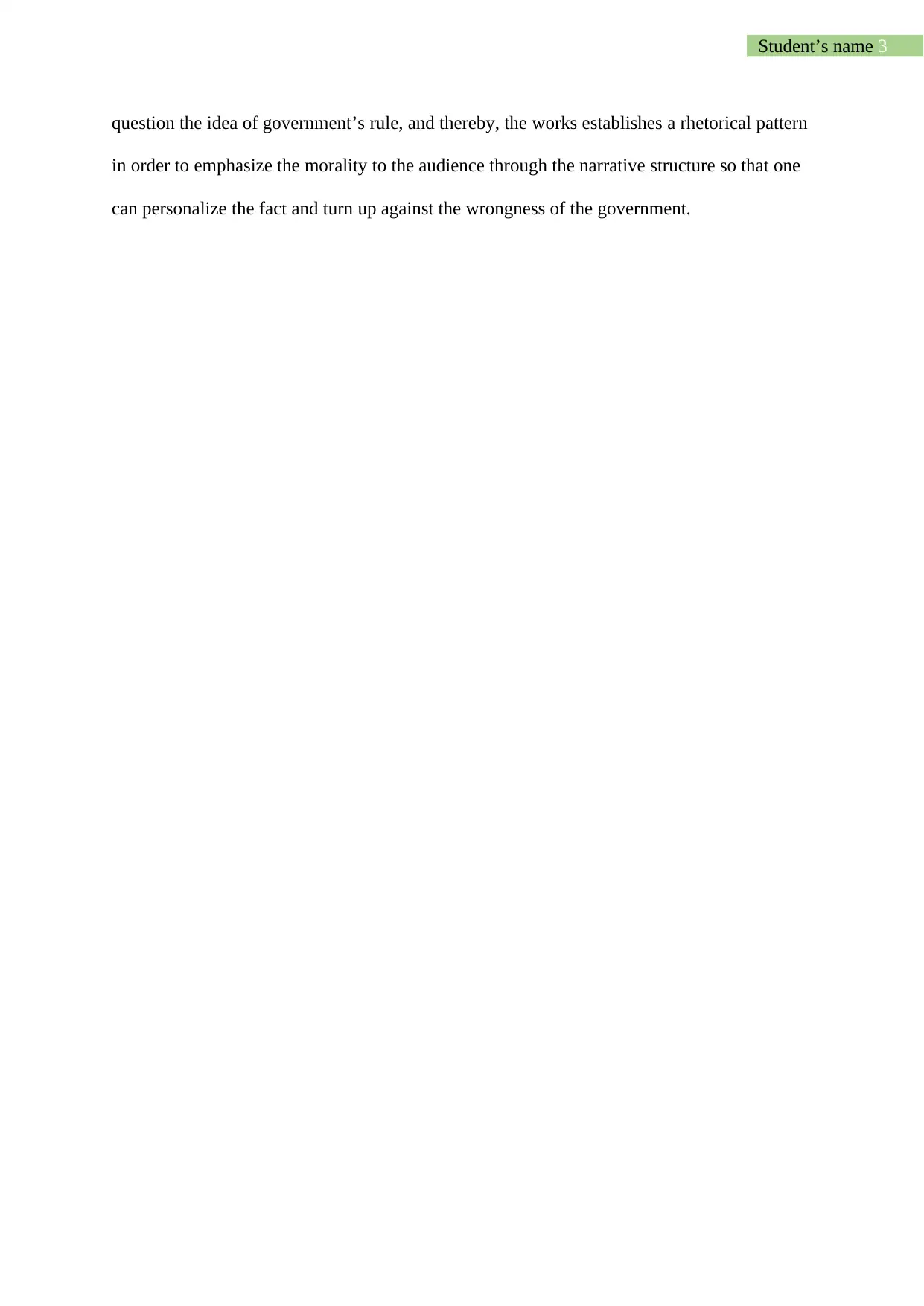
Student’s name 3
question the idea of government’s rule, and thereby, the works establishes a rhetorical pattern
in order to emphasize the morality to the audience through the narrative structure so that one
can personalize the fact and turn up against the wrongness of the government.
question the idea of government’s rule, and thereby, the works establishes a rhetorical pattern
in order to emphasize the morality to the audience through the narrative structure so that one
can personalize the fact and turn up against the wrongness of the government.
Paraphrase This Document
Need a fresh take? Get an instant paraphrase of this document with our AI Paraphraser
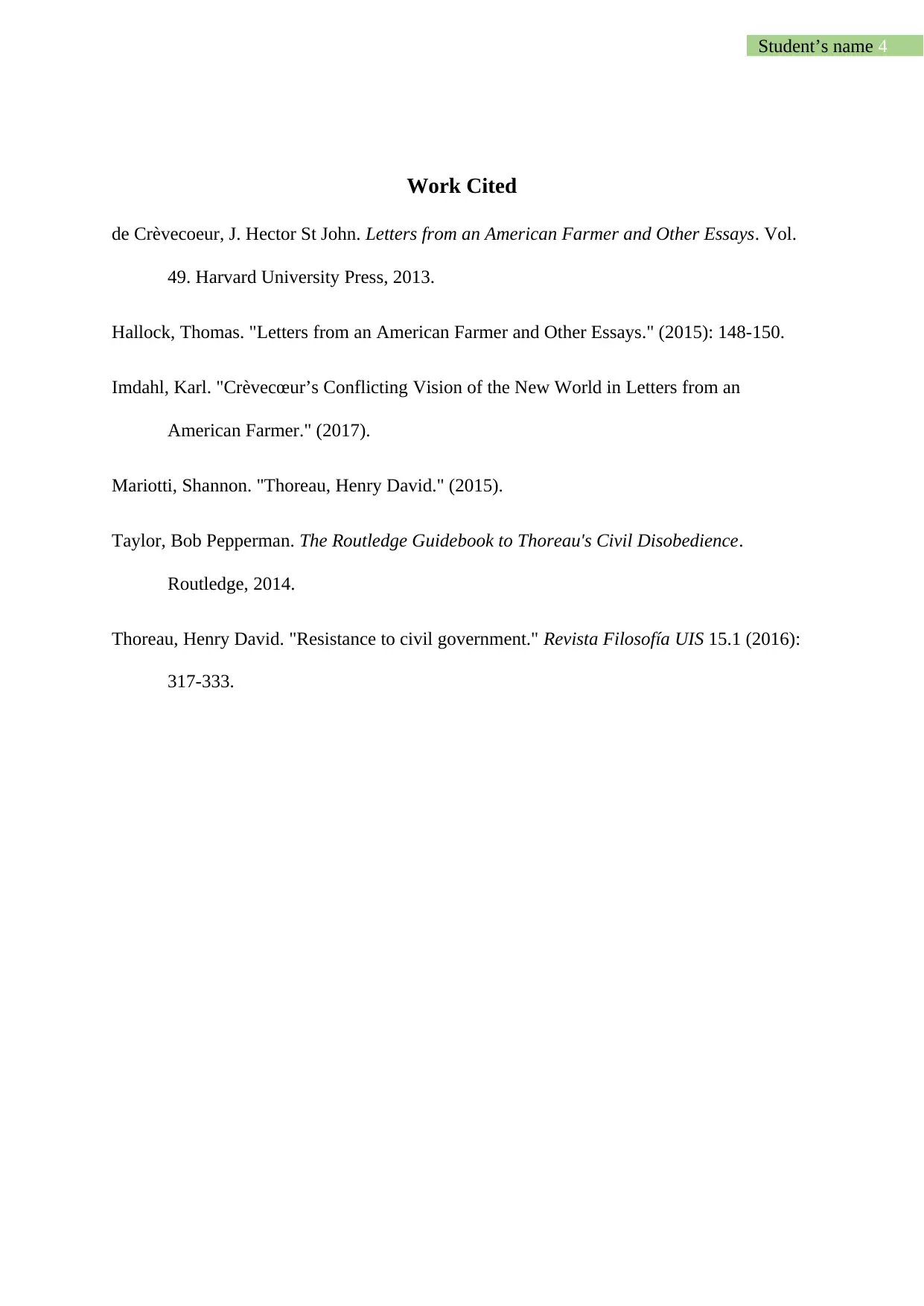
Student’s name 4
Work Cited
de Crèvecoeur, J. Hector St John. Letters from an American Farmer and Other Essays. Vol.
49. Harvard University Press, 2013.
Hallock, Thomas. "Letters from an American Farmer and Other Essays." (2015): 148-150.
Imdahl, Karl. "Crèvecœur’s Conflicting Vision of the New World in Letters from an
American Farmer." (2017).
Mariotti, Shannon. "Thoreau, Henry David." (2015).
Taylor, Bob Pepperman. The Routledge Guidebook to Thoreau's Civil Disobedience.
Routledge, 2014.
Thoreau, Henry David. "Resistance to civil government." Revista Filosofía UIS 15.1 (2016):
317-333.
Work Cited
de Crèvecoeur, J. Hector St John. Letters from an American Farmer and Other Essays. Vol.
49. Harvard University Press, 2013.
Hallock, Thomas. "Letters from an American Farmer and Other Essays." (2015): 148-150.
Imdahl, Karl. "Crèvecœur’s Conflicting Vision of the New World in Letters from an
American Farmer." (2017).
Mariotti, Shannon. "Thoreau, Henry David." (2015).
Taylor, Bob Pepperman. The Routledge Guidebook to Thoreau's Civil Disobedience.
Routledge, 2014.
Thoreau, Henry David. "Resistance to civil government." Revista Filosofía UIS 15.1 (2016):
317-333.
1 out of 5
Your All-in-One AI-Powered Toolkit for Academic Success.
+13062052269
info@desklib.com
Available 24*7 on WhatsApp / Email
![[object Object]](/_next/static/media/star-bottom.7253800d.svg)
Unlock your academic potential
Copyright © 2020–2025 A2Z Services. All Rights Reserved. Developed and managed by ZUCOL.